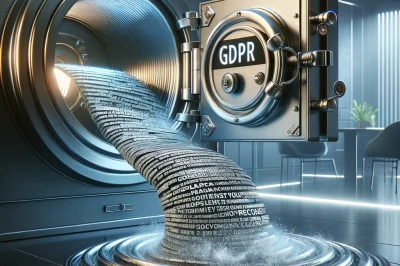Table of Contents

Article-at-a-Glance
- Understanding GDPR is crucial for small law firms to protect client data and avoid hefty fines.
- Compliance leads to enhanced client trust and a strengthened reputation.
- Key GDPR principles include obtaining consent and ensuring data accuracy.
- Appointing a Data Protection Officer (DPO) is a fundamental step in compliance.
- Regular audits and staff training are essential to maintain GDPR compliance.
Decoding GDPR for Your Small Law Firm
Think of GDPR as the guardian of data privacy for your clients. It’s not just a legal obligation but a way to show clients that you value and protect their privacy. If you’re running a small practice, GDPR compliance might seem daunting, but it’s achievable with the right knowledge and tools.
What is GDPR and Why Should Your Firm Care?
GDPR stands for General Data Protection Regulation, a European Union law that came into effect in May 2018. But it’s not just for EU-based firms. If you handle data from EU citizens, GDPR applies to you, too. It sets the bar high for data protection, with strict rules on how personal data should be collected, stored, and used.
Why care? Because non-compliance could lead to fines of up to 4% of your annual global turnover or €20 million, whichever is higher. More than that, it’s about building trust. Clients are more savvy about their data rights than ever, and they expect confidentiality and security from their law firm.
Immediate Benefits of GDPR Compliance
Adhering to GDPR isn’t just about avoiding penalties; it comes with benefits:
- Enhanced Reputation: Clients trust compliant firms with their sensitive data.
- Improved Data Management: Knowing what data you have and why you need it streamlines operations.
- Competitive Advantage: Compliance can be a differentiator in the marketplace.
Foundations of GDPR for Law Firms
At its core, GDPR is about respecting and securing personal data. Let’s break down what this means for your firm.
The Personal Data Your Firm Needs to Protect
Personal data is any information that can identify a person, whether directly or indirectly. This includes names, photos, email addresses, bank details, posts on social networking websites, medical information, or even a computer IP address.
Lawful Bases for Processing Client Data
You need a legitimate reason to process personal data under GDPR. This could be to fulfill a contract, comply with a legal obligation, protect someone’s vital interests, or if you have a legitimate interest that doesn’t override the rights of the individual.
Most importantly, consent plays a big role. It must be freely given, specific, informed, and unambiguous. Without clear consent, processing personal data is off the table.
Building Blocks of Compliance
Let’s get down to the nuts and bolts of what your law firm needs to do to comply with GDPR.
Appointing a Data Protection Officer
Depending on your firm’s size and the data you handle, you may need to appoint a Data Protection Officer (DPO). This person oversees data protection strategy and compliance. They’re your go-to expert on all things GDPR.
Creating a Compliant Data Processing Agreement
If you outsource any data processing, you need a Data Processing Agreement (DPA) in place. This contract ensures that the processor handles the data correctly and in line with GDPR requirements.
Example: A small law firm outsources payroll processing. They must have a DPA with the payroll company that outlines how employee data is protected and processed under GDPR.
This is just the start of your GDPR journey. There’s more to learn, and understanding your obligations is the first step to becoming compliant. Besides that, knowing GDPR inside out means you can confidently advise clients on their own compliance, adding more value to your services.
Stay tuned for more in-depth discussion on client data rights, data management, and incident response plans, all tailored to empower small law practices to achieve and maintain GDPR compliance.
How to Handle Access Requests
One of the pillars of GDPR is the right of individuals to access their personal data. As a law firm, you’re bound to receive such requests. Here’s how to handle them:
- Respond promptly – you have one month to reply to a request.
- Verify the identity of the requester to protect the data from unauthorised access.
- Provide a copy of the data in a clear and understandable format.
- Explain how and why the data has been processed.
Keep a log of access requests and responses. This will demonstrate compliance if you’re ever audited.
Ensuring the Right to be Forgotten
Another key right under GDPR is the ‘right to be forgotten’, or the right to erasure. If a client asks for their data to be deleted, you need to comply without undue delay, unless you have a legal ground to keep it. Document these requests and your responses to show compliance.
Data Management and Security
Good data management is the cornerstone of GDPR compliance. Let’s dig into how to audit your data and secure it properly.
Conducting a Data Audit: Where to Start?
Begin with an inventory of the personal data you hold. Ask yourself:
- What data do we have?
- Why do we have it?
- How long should we keep it?
- Is it secure?
Identifying gaps in your data management is the first step towards plugging them.
Developing Encryption and Access Protocols
Protecting your clients’ data means ensuring it’s encrypted and access is controlled. Implement strong encryption for data at rest and in transit. Access should be on a need-to-know basis, with strong authentication measures in place.
Incident Response Plan
In the event of a data breach, having an incident response plan is essential. This plan should outline:
- The immediate steps to secure data and limit damage.
- How to investigate the breach.
- Notification procedures for authorities and affected individuals.
- Post-incident review to improve future response.
An example incident response plan might include isolating affected systems, analysing the breach source, and communicating with affected clients within 72 hours, as required by GDPR.
Best Practices for Data Breach Notifications
When a breach occurs, transparency is key. Notify the relevant supervisory authority within 72 hours. If the breach poses a high risk to individuals’ rights and freedoms, inform them without unnecessary delay. Use clear and plain language in your communications.
Gearing Up Your Team for GDPR
Your staff are the frontline of data protection. They need to understand the importance of GDPR and how to comply with its requirements.
Staff Training Essentials on Data Protection
Training should cover:
- The basics of GDPR and why it matters.
- Recognising and reporting data breaches.
- Handling personal data securely.
Make GDPR training a regular part of your firm’s professional development program.
Cultivating a Culture of Data Privacy in Your Firm
Compliance is not just about policies; it’s about culture. Encourage a data privacy mindset among your team. Promote open discussions about data protection and reward those who identify risks or suggest improvements.
Ensuring Ongoing Compliance
GDPR compliance is not a one-time task. It’s an ongoing commitment.
Regular Check-ups: Auditing Your Firm’s GDPR Practices
Conduct regular audits to ensure your firm remains compliant. Look for changes in data processing activities and update your compliance measures accordingly.
Updating Policies: Staying Ahead of Legal Shifts
GDPR is not static; it evolves. Keep abreast of updates to the regulation and adjust your policies and practices to stay compliant. This is key to protecting your firm from penalties and preserving client trust.
Remember, GDPR compliance is not just about following the law; it’s about respecting your clients and protecting their rights. By embracing these practices, you can build a stronger, more trustworthy law firm.
Empowering your law firm with GDPR compliance isn’t just about meeting legal standards; it’s about demonstrating to your clients that their privacy is your priority. In this final section, we’ll explore practical success stories, debunk common myths, and answer your burning questions to ensure your firm’s GDPR mastery.
Case Study Analysis: How They Did It?
Consider the case of a boutique law firm that recently faced the challenge of GDPR compliance. By conducting a thorough data audit, they identified what data they had, why it was needed, and how it was stored. The firm also appointed a dedicated Data Protection Officer who was instrumental in developing comprehensive data protection policies and training programs for all staff members.
The firm’s proactive approach to GDPR compliance not only safeguarded them against potential fines but also significantly enhanced their reputation among clients. They demonstrated their commitment to data protection by transparently communicating their GDPR strategies, which in turn attracted more clients who valued privacy and security.
Transferable Strategies for Your Practice
What can your small law firm learn from this success story? Here are some strategies you can adopt:
- Start with a data audit and create an inventory of all personal data you handle.
- Consider appointing a Data Protection Officer to oversee your compliance efforts.
- Implement regular staff training sessions to ensure everyone understands their role in maintaining GDPR compliance.
- Develop clear, concise data protection policies and make sure they are accessible to all employees.
By following these steps, you can not only comply with GDPR but also build a culture of data protection within your firm.
Final Considerations for GDPR Mastery
GDPR compliance is an ongoing journey. It requires vigilance, regular updates to your policies, and a commitment to best practices. As you continue to navigate the complexities of GDPR, remember that it’s a framework designed to protect individuals’ data rights and enhance trust between clients and their law firms.
Common GDPR Myths Debunked
There are several misconceptions about GDPR that can lead law firms astray. Let’s clear up a few:
- Myth: Small firms are exempt from GDPR. Truth: GDPR applies to organisations of all sizes that process personal data of EU citizens.
- Myth: GDPR compliance is a one-time task. Truth: GDPR requires ongoing monitoring and updates to ensure continuous compliance.
- Myth: Only EU-based firms need to comply with GDPR. Truth: Any firm that handles the data of EU citizens, regardless of its location, must comply with GDPR.
By understanding the facts, you can ensure that your firm takes the right steps towards GDPR compliance.
Partner With Experts in Data Protection
Partnering with experts in data protection can provide your firm with the guidance needed to navigate GDPR’s complexities. A specialised agency can offer tailored solutions, ensuring that your compliance efforts are both effective and efficient.
If you’re looking for expert assistance in crafting a robust GDPR compliance strategy, consider exploring our content marketing service for Law Firms. We can help you understand the intricacies of GDPR and implement best practices to safeguard your firm and your clients’ data.
Frequently Asked Questions
Let’s address some common questions that small law firms may have about GDPR compliance.
What Exactly Does a Data Protection Officer Do?
A Data Protection Officer (DPO) oversees data protection strategy and implementation to ensure compliance with GDPR requirements. They are responsible for conducting audits, providing training, and serving as the point of contact between the firm and regulatory authorities.
Is My Small Law Firm Really Affected by GDPR?
Yes, if your firm processes the personal data of individuals in the EU, you are required to comply with GDPR, regardless of your firm’s size.
How Often Should We Train Our Staff on GDPR?
Staff training should be an ongoing process, with refreshers at least once a year or whenever there are significant changes to data protection laws or your firm’s data processing activities.
Can We Handle GDPR Compliance Internally?
While it’s possible to manage GDPR compliance internally, it requires a deep understanding of the regulation and the ability to stay up-to-date with changes. For many firms, partnering with experts can be more effective.
Where Can I Learn More About GDPR Compliance?
To further your understanding of GDPR and how it applies to your small law firm, consider visiting our content marketing service for Law Firms. You’ll find in-depth resources and expert guidance to help you navigate the complexities of GDPR compliance.
Remember, GDPR compliance is a journey, not a destination. It’s about continuous improvement and adaptation. By staying informed, vigilant, and proactive, your law firm can not only comply with GDPR but also demonstrate a commitment to data protection that will set you apart in the legal industry.






